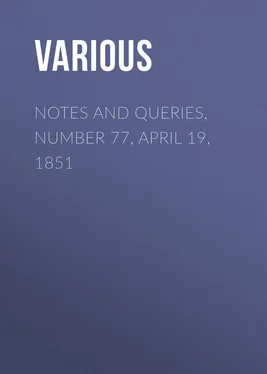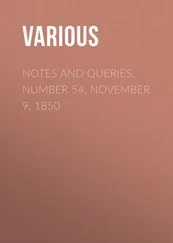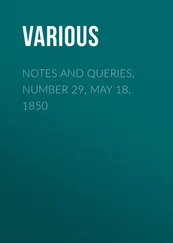Various - Notes and Queries, Number 77, April 19, 1851
Здесь есть возможность читать онлайн «Various - Notes and Queries, Number 77, April 19, 1851» — ознакомительный отрывок электронной книги совершенно бесплатно, а после прочтения отрывка купить полную версию. В некоторых случаях можно слушать аудио, скачать через торрент в формате fb2 и присутствует краткое содержание. Жанр: foreign_antique, periodic, foreign_edu, на английском языке. Описание произведения, (предисловие) а так же отзывы посетителей доступны на портале библиотеки ЛибКат.
- Название:Notes and Queries, Number 77, April 19, 1851
- Автор:
- Жанр:
- Год:неизвестен
- ISBN:нет данных
- Рейтинг книги:3 / 5. Голосов: 1
-
Избранное:Добавить в избранное
- Отзывы:
-
Ваша оценка:
- 60
- 1
- 2
- 3
- 4
- 5
Notes and Queries, Number 77, April 19, 1851: краткое содержание, описание и аннотация
Предлагаем к чтению аннотацию, описание, краткое содержание или предисловие (зависит от того, что написал сам автор книги «Notes and Queries, Number 77, April 19, 1851»). Если вы не нашли необходимую информацию о книге — напишите в комментариях, мы постараемся отыскать её.
Notes and Queries, Number 77, April 19, 1851 — читать онлайн ознакомительный отрывок
Ниже представлен текст книги, разбитый по страницам. Система сохранения места последней прочитанной страницы, позволяет с удобством читать онлайн бесплатно книгу «Notes and Queries, Number 77, April 19, 1851», без необходимости каждый раз заново искать на чём Вы остановились. Поставьте закладку, и сможете в любой момент перейти на страницу, на которой закончили чтение.
Интервал:
Закладка:
Various
Notes and Queries, Number 77, April 19, 1851 / A Medium of Inter-communication for Literary Men, Artists, Antiquaries, Genealogists, etc
Notes
LATIN DRINKING SONG BY RICHARD BRAITHWAIT
I have been surprised, from the facility with which the author of "Drunken Barnaby" seems to pour out his Leonine verse, that no other productions of a similar character are known to have issued from his pen. I am not aware that the following drinking song, which may fairly be attributed to him, has ever appeared in print. It was evidently unknown to the worthy Haslewood, the crowning glory of whose literary career was the happy discovery of the author, Richard Braithwait. I transcribe it from the MS. volume from which James Boswell first gave to the world Shakspeare's verses "On the King." Southey has somewhere said that "the best serious piece of Latin in modern metre is Sir Francis Kinaston's Amores Troili et Cressidæ , a translation of the two first books of Chaucer's Poem 1 1 Southey was not aware that the whole of Chaucer's Poem, and the "Testament of Cressid," by Henryson, was translated by Kinaston and accompanied by a copious commentary in English, but only exists in one sole MS. The press of the Camden Society would be well employed on it.
; but it was reserved for famous Barnaby to employ the barbarous ornament of rhyme, so as to give thereby point and character to good Latinity."
Southey does not seem to have known those remarkable productions of the middle ages, which have been made accessible to us by the researches of Docen, of Grimm, of Schmeller, and of Mr. Wright; and, above all, of that exquisite gem, "De Phyllide et Flora," first printed by Docen 2 2 In Baron von Aretin's Beytrage zur Geschichte und Literatur , vol. vii. p. 301.; but the copy, though a good text, was defective at the end.
, and since given by Mr. Wright in his collection of Poems attributed to Walter de Mapes . We have, however, a much better text from the hand of Jacob Grimm, in the Memoirs of the Academy of Berlin for 1843 , p. 239. Of this poem it is perhaps not exaggeration to say, that it is an Idyll which would have done honour to the literature of any age or country; and if it is the production of Walter de Mapes, we have reason to be proud of it. It is a dispute between two maidens on the qualities of their lovers, the one being a soldier, the other a priest. It breathes of the spring, of nature, and of love:
"Erant ambæ virgines et ambæ reginæ
Phyllis coma libera Flora comto crine,
Non sunt formæ virginum sed formæ divinæ,
Et respondent facies luci matutinæ.
Nec stirpe, nec facie, nec ornatu viles,
Et annos et animos habent juveniles
Sed sunt parum inpares, et parum hostiles
Nam hinc placet clericus illi vero miles."
Love is called in to decide the dispute, and it causes no surprise to find, after due ventilation of the cause, the judgment of the court to be:
"Secundum scientiam et secundum morem,
Ad amorem clericum dicunt aptiorem."
Your readers who are not already acquainted with this interesting picture of ancient manners will, I think, be pleased with having it pointed out to their notice.
Should the following song not be already in print, I can also furnish from the same source a version of the ballad on "Robin Goodfellow" by the same hand, should it be acceptable. 3 3 [We are sure we are only expressing the opinion of the majority of our readers when we say it will be most acceptable .—Ed.]
"O Pampine! quo venisti?
Cur me spectas fronte tristi?
Tolle caput, sis jucundus,
Tolle poculum exue fundus,
Et salutem jam bibamus,
Ad sodales quos amamus;
O Pampine! tibi primum
Haustum summus hunc ad imum.
Ecce de christallo factum
Purum vas, et hoc intactum,
Lympha nunc et succo plenum,
Nec includit hoc venenum;
Medicamen quod repellit
Omnes malos, nec fefellit,
O Pampine! invito Momo,
Tibi, tu es meus homo.
Hic est sacer fons et flumen,
Quod qui potant vocant numen,
Iras pellit, demit lites,
Et superbos facit mites;
Et post flumen hoc te amœnum
Annos reparare senum:
O Pampine! tibi habe,
Bibe si sis dignus tabe.
Hoc si tu gustabit nectar,
Si sis Paris fies Hector,
Iras demit inquietas,
In memento facit lætas;
Pro doloribus est solamen,
Pro pulicibus medicamen;
O Pampine! habe tibi,
Bibe tu cum ego bibi.
Hic est aqua vera fortis,
Vincula quæ solvet mortis,
Aut, si placet, aqua vitæ,
Roborans ab atra Dite:
Hinc sunt uti qui potestis
Omnia, cibus, potis, vestis;
O Pampine! tibi cito
Bibe, aut ab hinc abito.
Si frigistis, sine joco,
Solo hoc utare foco,
Si esuries hic sunt oves,
Pulli, vituli, et boves;
Quod si sitis ecce montem,
Quem si scandes habet fontem;
O Pampine! bibe rursus,
Bibe, tu nam venit cursus.
Si ægrotas sume potum,
Vis ut valeas tolle totum,
Cape potum hunc paratum,
Sanus eris,—est probatum;
Si in corpore aut in mente
Dolebant in quavis dente;
O Pampine! tibi statim
Sume potum hinc gradatim.
Bacche jam et jam Silene,
Pocula impleatis plene,
Ope jam adiutus vestra
Domum, feram e fenestra.
Ædes vertunt jam rotundæ,
Et succedant res secundæ:
O Pampine! tibi bibo,
Bibe, vale! ego abibo."
STRANGE APPEARANCES IN THE SKY
Strange appearances in the sky have not been without their ominous signification from the time that the greater and lesser lights were placed there at the creation, to the rainbow after the Deluge; and onward to the "star in the east" which announced our Saviour's birth, and the "light from heaven" which accompanied St. Paul's conversion. But the question is, whether there has since been any meaning in other like celestial illuminations? Some historical credit is claimed for the fiery sword, and armies fighting in the air, which preceded the siege of Jerusalem: for the cross of the Emperor Constantine: for the bow about the sun seen by Augustus Cæsar, when he took possession of the Roman empire: and for stars, or other heavenly lights, which have seemed to herald the births or deaths of illustrious personages. But are these stories to be believed? and, if they are, where is the line of credibility to be drawn? People cannot come together, and talk either on this subject, or on that of ghosts, but every one "hath a revelation, hath an interpretation." The poet, walking on the mountains, looked into the sky, and
"The appearance, instantaneously disclosed,
Was of a mighty city—boldly say
A wilderness of building, sinking far,
And self-withdrawn, into a wondrous depth,
Far sinking into splendour—without end?"
The two following extracts are from private letters now before me. The first account was written in 1825 by a physician, still alive, and who at the time read an account of what he had seen at a meeting of the Plinian Society. He says,
"I last evening read a paper upon an extraordinary appearance of letters, formed by the clouds, seen by a Mr. T. and myself. We had also with us two little boys, one nine, the other eleven years of age, who were able to make out each letter equally with ourselves. These children were at the time walking some distance behind us: but, upon their coming up, and being shown the letters, they read them without having heard any observation of ours respecting them. We saw them for about two minutes, when they gradually changed their form—each letter changing its perpendicular for a horizontal position, and at length the whole becoming converted into that form of cloud denominated cirro-stratus. I will endeavour to give you a faint idea of the appearance, by forming the letters as well as my memory will enable me. I make no comment upon the words themselves, as they are too extraordinary for observation of any kind. It was upon the 12th of last month: several showers had fallen in the course of the day, but the afternoon was fine. The time seven in the evening. The letters were formed upon a fine blue surface, having no other clouds near them, except very small ones, which tended much to heighten the effect of the whole.
Читать дальшеИнтервал:
Закладка:
Похожие книги на «Notes and Queries, Number 77, April 19, 1851»
Представляем Вашему вниманию похожие книги на «Notes and Queries, Number 77, April 19, 1851» списком для выбора. Мы отобрали схожую по названию и смыслу литературу в надежде предоставить читателям больше вариантов отыскать новые, интересные, ещё непрочитанные произведения.
Обсуждение, отзывы о книге «Notes and Queries, Number 77, April 19, 1851» и просто собственные мнения читателей. Оставьте ваши комментарии, напишите, что Вы думаете о произведении, его смысле или главных героях. Укажите что конкретно понравилось, а что нет, и почему Вы так считаете.












